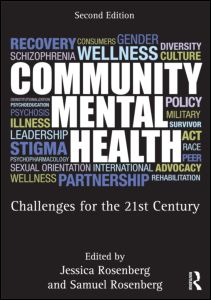
In Community Mental Health: Challenges for the 21st Century, Jessica Rosenberg and Samuel Rosenberg provide a comprehensive overview of the most up-to-date research on best practices in community mental health in today’s culture and political climate. The quality of information that this book provides is strengthened by the unique contributions of experts from numerous mental health-focused disciplines, including social work, psychiatry, psychology, nursing, public health and law. Infused into each chapter is an emphasis on the importance of addressing the stigma associated with mental health concerns and promoting a recovery philosophy that empowers individuals to pursue lives that go beyond simply resigning themselves to living unresponsively with mental illness.
Community Mental Health is a 320-page book that covers a range of topics and unfolds into six major sections. In Part One, chapter authors describe how stigma impacts persons with mental health issues in general and how being a part of a marginalized group often compounds that stigma. The authors then describe a recovery philosophy that emphasizes mental health treatment founded on hope, respect and humane treatment. Part Two of the text focuses on emerging trends in mental health care, including work with veterans returning from active combat and developments in forensic mental health. In Part Three, community mental health is approached from a developmental perspective, with authors examining work carried out with children and adolescents, families, and an elderly population that is increasing due to the aging Baby Boomer generation. Part Four explores considerations related to counseling diverse populations, ranging from the historical and present racism experienced by African Americans, to ways of providing mental health services that account for differing cultural perspectives. In Part Five, chapter authors describe up-to-date best practices for working in community settings with varying populations, including assertive community treatment and treatments for adults experiencing both mental and substance use disorders. Finally, Part Six analyzes the circumstances that influence how public policy and the changing landscape of our society impact community mental health.
Community Mental Health possesses many strengths. Each chapter concludes with discussion questions, learning assignments, suggested readings and Internet resources that facilitate continued conversation about and exploration of each chapter’s respective theme, making this book especially valuable for use in a dialogical setting. The text carries a message for students and professionals alike—advocacy remains an essential component of the activity of mental health practitioners. It also serves as a compelling reminder of how much of counseling work necessitates addressing the stigma of mental health, both with clients and within the society in which clients live.
A potential limitation of Community Mental Health is that, because the book addresses a number of different topics and populations, it does not always provide great detail about the evidence-based treatment practices cited. The text also does not always provide its reader with case studies to further describe how community-based treatments work in actual application with clients. Although one merit of the book is providing a strong overview of each of the different topics presented, readers who desire more in-depth information may need to seek out further resources. However, the chapter authors address this issue by suggesting both additional readings and Internet resources.
Community Mental Health: Challenges for the 21st Century is a valuable resource for current and future mental health professionals, policy makers and advocates, and represents an important resource for those engaged in increasing the effectiveness and humaneness of mental health service provision.
Rosenberg, J., & Rosenberg, S. (Eds.). (2013). Community mental health: Challenges for the 21st century. New York, NY: Routledge.
Reviewed by: Adam Miller, graduate student, Florida State University, Tallahassee, FL.
The Professional Counselor
https://tpcwordpress.azurewebsites.net/
